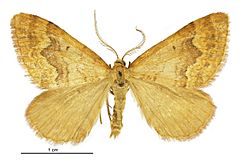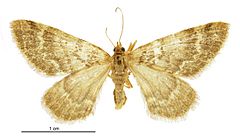Asaphodes aphelias facts for kids
Quick facts for kids Asaphodes aphelias |
|
|---|---|
 |
|
| Male | |
 |
|
| Female | |
| Scientific classification | |
| Kingdom: | |
| Phylum: | |
| Subphylum: | |
| Class: | |
| Order: | |
| Family: | |
| Genus: |
Asaphodes
|
| Species: |
A. aphelias
|
| Binomial name | |
| Asaphodes aphelias (Prout, 1939)
|
|
| Synonyms | |
|
|
The Asaphodes aphelias is a special type of moth found only in New Zealand. It belongs to a group of moths called Geometridae. These moths are sometimes called "inchworms" because of how their caterpillars move.
This unique moth was first found in a place called Hump Ridge in Fiordland. A scientist named Alfred Philpott collected the very first one. Another scientist, Louis Beethoven Prout, officially described and named this moth in 1939.
Contents
Meet the Asaphodes Aphelias Moth
The Asaphodes aphelias is a fascinating insect. It is a type of moth, which means it is related to butterflies. Moths are known for flying mostly at night.
What is a Geometer Moth?
The Asaphodes aphelias is part of the Geometridae family. This family is very large, with over 23,000 different kinds of moths. Many of them have thin bodies and broad wings. Their caterpillars are often called "inchworms" because they move by looping their bodies.
Where Does This Moth Live?
The Asaphodes aphelias moth is endemic to New Zealand. This means it lives naturally only in New Zealand and nowhere else in the world. It was first discovered in the beautiful Fiordland region, specifically near Hump Ridge.
Hump Ridge: A Special Place
Hump Ridge is a rugged area in the southwest of New Zealand's South Island. It is known for its stunning natural beauty. This area is part of Fiordland National Park, which has mountains, forests, and deep fiords. It is a perfect home for unique wildlife like the Asaphodes aphelias moth.
Who Discovered and Named It?
The story of the Asaphodes aphelias involves two important scientists.
Alfred Philpott's Discovery
Alfred Philpott was a New Zealand entomologist. An entomologist is a scientist who studies insects. He collected the first specimen of this moth. He initially gave it a different name, Xanthorhoe helias obscura.
Louis Beethoven Prout's Description
Later, in 1939, a British entomologist named Louis Beethoven Prout officially described the species. He gave it the scientific name Asaphodes aphelias. This is the name we use today.
Images for kids



